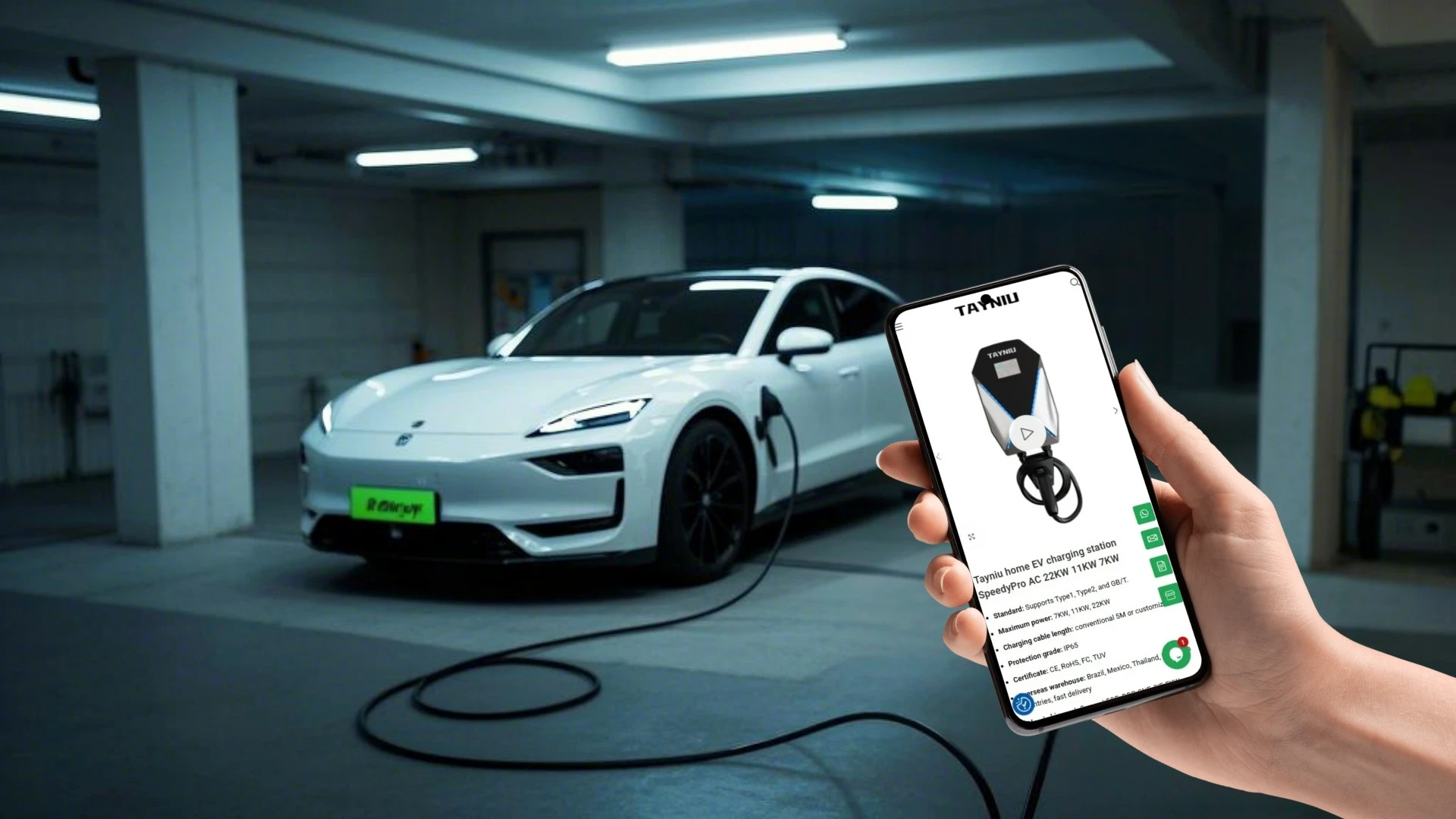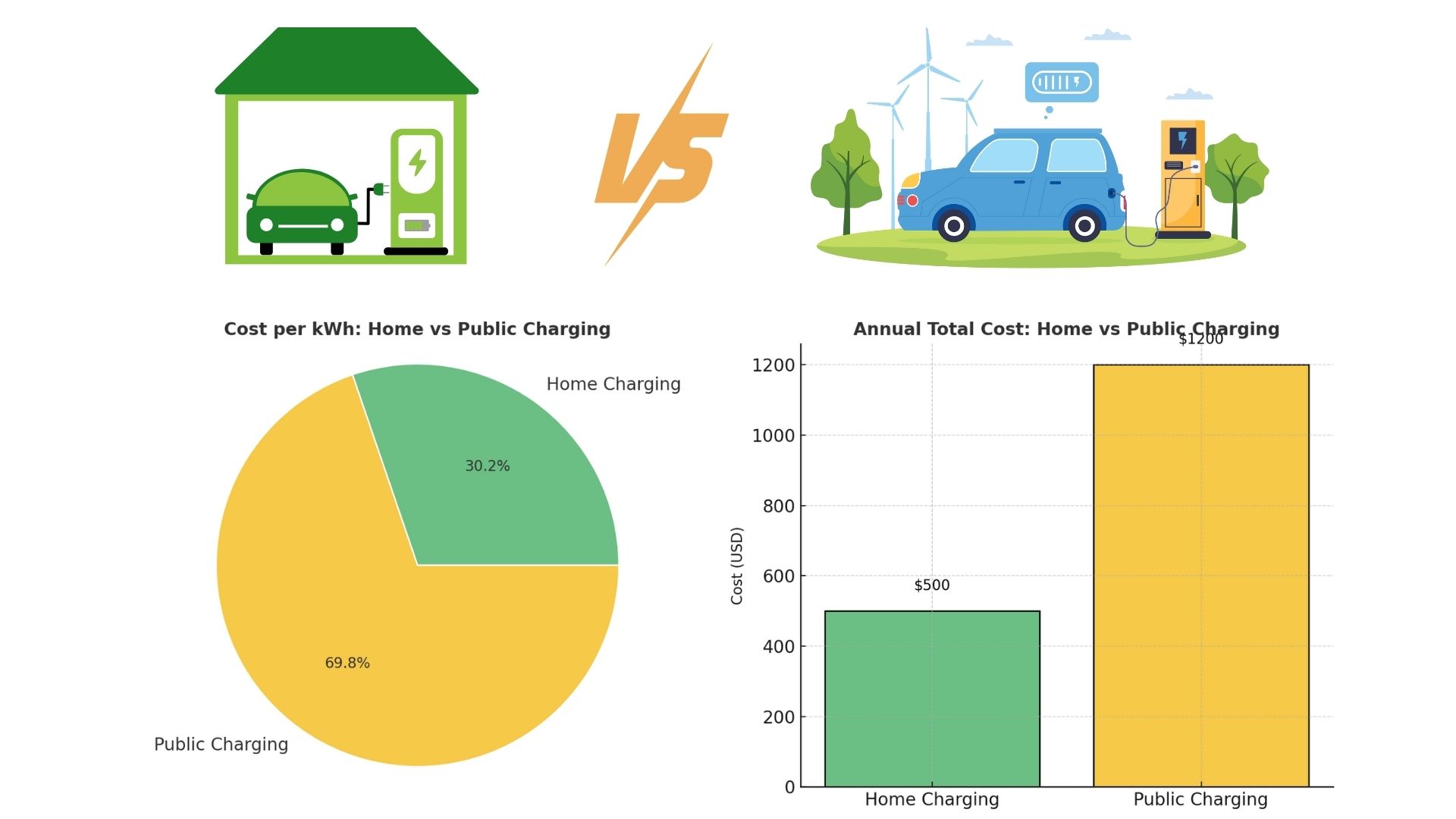EV Home vs Public Charging: Key Pros, Cons & Costs
As electric vehicles (EVs) become more popular, many drivers wonder: Should I install a home EV charger or depend on public charging stations? The decision isn’t always easy, as each option has its own advantages and drawbacks. In this guide, we’ll explore the key advantages, drawbacks, and costs associated with EV home charging vs public charging, helping you determine the best solution for your needs. Additionally, we’ll introduce how Tayniu—a trusted provider of certified EV charging solutions—can support your charging journey.
Pros and Cons of Home EV Charging
Advantages of Home Charging:
- Convenience and Flexibility: Imagine waking up to a fully charged EV each morning. Home charging eliminates the need to detour for power, providing unmatched convenience. With Tayniu’s home AC charging stations, you can easily schedule charging sessions during off-peak hours to save on energy costs.
- Cost Efficiency Over Time: While installing a home charging station requires an initial investment, the long-term savings are significant. Charging at home, especially during off-peak hours, can cut energy costs substantially. Tayniu’s SpeedPro Series chargers offer customizable power options (7kW, 11kW, and 22kW) to match your household’s electrical capacity and maximize cost-effectiveness.
- Enhanced Safety Features: Home chargers, like Tayniu’s IP65-rated units, come equipped with built-in safety mechanisms such as overcurrent, overvoltage, and temperature protection, ensuring a secure and reliable charging experience.
Disadvantages of Home Charging:
- Upfront Costs: Installing a home charging system involves purchasing the charger and possibly upgrading your electrical system. However, Tayniu’s products are TÜV-certified and built to last, ensuring long-term value.
- Power Supply Limitations: Some older homes may require electrical upgrades to support a high-power charger. Consulting with a professional installer can help assess your system’s capacity.

Tip: For maximum flexibility, Tayniu’s portable chargers offer plug-and-play convenience, making it easy to charge at home or on the go.
Pros and Cons of Public EV Charging
Advantages of Public Charging:
- Accessibility for Long-Distance Travel: Public charging networks, especially DC fast chargers, are essential for extended road trips. Tayniu’s commercial DC chargers support multiple international standards (GB, CEN, ANSI, and JIS), ensuring regional compatibility.
- No Installation Required: Public stations require no upfront investment in hardware or electrical work. Users pay for the electricity they use.
Disadvantages of Public Charging:
- Higher Long-Term Costs: Public charging rates often exceed residential electricity prices, especially when using fast chargers. Over time, these costs add up, making home charging more economical.
- Inconvenience and Wait Times: Charging on the go can mean long waits during peak hours or dealing with malfunctioning equipment.
Insight: Balancing home charging with occasional public charging is often the most cost-efficient strategy. Tayniu’s versatile charging solutions make this hybrid approach seamless.
Cost Comparison – Home vs Public Charging
| Charging Type | Initial Investment | Ongoing Costs | Convenience |
|---|---|---|---|
| Home Charging | $500 – $2,000 (Tayniu SpeedyPro Series) | Low (off-peak rates) | High (anytime use) |
| Public Charging | None | Higher per kWh cost | Moderate to low (depending on station availability) |
From a cost perspective, home charging usually proves more economical in the long run, especially for daily commuters. According to industry research, home charging costs around $0.13 per kWh, compared to $0.30 per kWh for public charging. Tayniu’s customizable home charging stations provide reliable, cost-efficient solutions tailored to individual household needs.
Tips: The initial investment typically covers the cost of the home charging unit, installation, and any required electrical upgrades, offering a clearer picture of the overall expenses.

How to Choose the Right Charging Option
- Driving Habits: If you drive daily for work or errands, home charging is often the most convenient and cost-effective choice.
- Budget Considerations: While public charging involves no initial investment, frequent use leads to higher cumulative costs. Home chargers like Tayniu’s SpeedPro Series offer a solid long-term return on investment.
- Travel Frequency: Regular long-distance travelers may benefit from combining a home charger with a portable Tayniu charger for added flexibility.
Tayniu’s EV Charging Solutions
Tayniu specializes in delivering high-quality, certified EV charging solutions to meet diverse customer needs:
- Reliable EV Home AC Chargers: Available in 7kW, 11kW, and 22kW versions, with IP65 protection and intelligent scheduling capabilities.
- Portable Chargers: Lightweight and compatible with Type1, Type2, and GB/T interfaces, perfect for both home and travel use.
- Commercial DC Chargers: Supporting four international standards—GB, CEN, ANSI, and JIS—these chargers are ideal for businesses and public infrastructure.
Did You Know? Tayniu has overseas warehouses in places like the United States and Poland to ensure fast and reliable deliveries worldwide.
Conclusion: What’s Your Best Charging Option?
Choosing between home and public EV charging depends largely on your driving habits, budget, and daily routines. While public charging is essential for long-distance travel, home charging provides unmatched convenience and cost savings for daily use.
Tayniu offers a wide range of EV chargers designed to deliver efficient, safe, and cost-effective charging wherever you are. Whether you’re seeking a fixed home charging station, a portable unit for travel, or robust commercial infrastructure, Tayniu has you covered.
Question to Ponder: As solar-powered chargers become more accessible, could the future of EV charging shift entirely toward home-based solutions? Tayniu remains committed to innovation, helping drivers worldwide adopt greener, more efficient charging practices.
Last Updated on February 14, 2025 by tayniu
